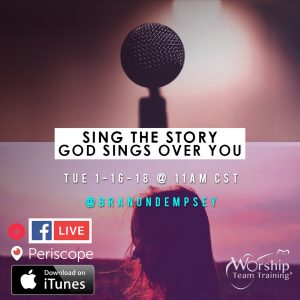Leaders, WTTU Special Public Post
Show #150 | “Everlasting Songs” #Worship In Your Church
rship In YOur Church
 #HymnsThatLast
#HymnsThatLast
2 min read | 30m Show
Why Hymns Aren’t Necessarily Better
As a worship leader, do you run into people who still are debating whether it is better to sing hymns versus modern worship songs? Should your musical diet of songs include just one or other, or both?Learn why one type of song is not better than the other, and why both hymns and worship songs play an important role.
WATCH SHOW #150
Are Hymns Superior?
I recently read another online post from someone who formerly was a strong advocate of contemporary worship songs but is now using hymns almost exclusively. The reason? Because of the superiority of hymns.Perhaps I’ve just been in the wrong place at the wrong time, but I have encountered several such articles in recent months. And, honestly, I think it’s time that someone offers a different perspective.
First, let me say that I am – and have been for years – a strong proponent of hymns. For the first time in quite awhile, I led worship in the Sunday service for our congregation not long ago. Someone approached me afterward and said, “I loved the hymns. Thanks for including them.” So, be warned that I am not on an anti-hymn crusade.
Having said that, let’s get started.
The Best Will Remain
Isaac Watts (1674-1748) composed over 600 hymns. Fanny Crosby (1820-1915) claimed to have penned more than 8,000. George Matheson (1842-1906) wrote hundreds. According to a well-documented article in Christianity Today, Charles Wesley (1707-1788) wrote nearly 9,000 hymns. That’s just four hymnwriters – who are greatly revered in many circles – with a combined body of work totaling in the neighborhood of 18,000 hymns. If you consider that the average hymnal in America contains about 600 hymns, there seems to be something wrong, something disproportional. What happened to the other 17,000-plus? And that’s not even mentioning the hundreds of other hymnwriters.The fact is that no one I’ve ever met can name more than a handful of songs from any of the four composers I just mentioned. Hold on a minute, Tom. I thought they wrote hundreds, or even thousands, of hymns. They did. But the vast majority were not the quality of the ones that have survived through to today. They were used for a short time and discarded. They may even have been popular in their day, but did not have what was necessary to endure.
Let’s be honest. Do you really think it’s fair to compare the entire body of modern “worship” songs to the few hymns that have stood the test of time?
The fact is that a hundred years from now, a small number of songs that are being used today will have endured. Those will have become the classics. But to say we should throw out all modern songs because, as a whole, they’re not as good as the hymns that have been proven over time? That’s absurd. By that same logic then, in the early 1900s, all of Fanny Crosby’s and George Matheson’s songs should have been discarded. What a tragedy that would have been.
[ctt template=”6″ link=”7Pl1I” via=”no” ]Ephesians 5:19, ” Speaking to yourselves in psalms and hymns and spiritual songs, singing and making melody in your heart to the Lord.”[/ctt]
Doctrine vs. Relationship
I would also have us consider another factor. The majority of the older hymns do a great job with teaching doctrine, but they are rarely about having a true relationship with the Lord. Whereas, I am always in favor of good, solid, biblical doctrine, the fact is that Jesus didn’t die for doctrine.* He died so that people could once again be in right relationship with God. Jesus said, “I have called you friends.” (John 15:15)Many of the modern songs – certainly not all – do a far better job of expressing that relationship aspect than the hymns of old. Of course, some modern songs do, indeed have strong theology, and a few older hymns do have a strong relational aspect. But please hear what I’m saying. I’m not suggesting that the relational aspect of many newer songs makes them emphatically better. They simply serve a different – and necessary – purpose. They allow us to express honest, heartfelt relationship with the Lord in a way that many doctrinely-laden hymns do not.
[ctt template=”6″ link=”7Pl1I” via=”no” ]Psalm 150, “Praise ye the Lord. Praise God in his sanctuary: praise him in the firmament of his power. Praise him for his mighty acts: praise him according to his excellent greatness.[/ctt]
Not Either Or
The vast majority of the newer songs will not endure two or three generations from now. But then, neither did the vast majority of songs from previous eras. However, some of those modern-day songs are exactly what the Church needs now.To jettison the songs of today as a whole would be similar to saying we must all use the original 1611 King James Version of the Bible and speak in Olde English. And we all know why we don’t do those things. Because we live in a different culture, a different society. People think and act differently than they did when Isaac Watts was writing songs. So, to insist that our songs must be from another era, while not using the same argument in other areas of our church practices, would be to create a false dichotomy.
If you want to use hymns exclusively in your church, go ahead. Just don’t insist that yours is the only right way, or even the absolute best way. Today’s songwriters are creating songs that God is using in His Church today. Certainly, they will not all be sung by our great-grandchildren, but I really don’t think we should expect them to be.
Those future generations – if the Lord tarries in returning – will have their own hymnwriters, whose songs will be used, and then many of them will be discarded. And that’s okay. Just ask Charles Wesley.
 Tom Kraeuter (pronounced Kroyter) is one of America’s leading voices on Christian worship. He serves as Executive Director of Training Resources, a ministry devoted to strengthening Christians in their relationships with God and with one another.
Tom Kraeuter (pronounced Kroyter) is one of America’s leading voices on Christian worship. He serves as Executive Director of Training Resources, a ministry devoted to strengthening Christians in their relationships with God and with one another. He is an author, worship leader, and gifted communicator who has ministered in hundreds of churches to tens of thousands of worshipers. Tom’s ministry is marked by his ability to apply Scripture to everyday situations.
Kraeuter is author of 20 books including Worship In Heaven … and Why on Earth It Matters, Worshiping God in the Hard Times and The Great Soviet Awakening. His books have been translated into multiple languages around the world. He has been a part of Christian Outreach Church near St. Louis, Missouri, for nearly forty years. He and his wife Barbara have three adult children.
@BranonDempsey @worshiptt @WorshipTTU
Want to watch MORE Worship Team Training Videos?
Not a WTTU Member, or Choose to Upgrade? Update Now
 Worship Team Training® Is your worship team stuck? Want worship leading to be better? Want to be free? We can take you there. Inspire, create and transform the leading of worship. Get a WeekendWorkshop
Worship Team Training® Is your worship team stuck? Want worship leading to be better? Want to be free? We can take you there. Inspire, create and transform the leading of worship. Get a WeekendWorkshopCopyright 2017 Worship Team Training®









